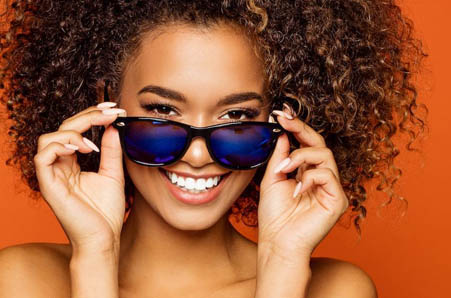Choosing the right sunglasses goes beyond style; it’s crucial for protecting your eyes from harmful UV radiation and ensuring overall eye health. Here’s a comprehensive guide on how to select sunglasses that prioritize eye protection:
Understanding UV Protection
Importance of UV Protection
UV rays from the sun can damage your eyes, leading to conditions like cataracts, macular degeneration, and photokeratitis (sunburn of the cornea). Quality sunglasses block these harmful rays and reduce your risk of eye problems.
UV Rating
Look for sunglasses that offer 100% UV protection or UV 400. This ensures they block both UVA and UVB rays effectively. UV 400 means the lenses block wavelengths up to 400 nanometers, covering all UV rays.
Lens Types and Features
Polarized Lenses
Polarized lenses reduce glare from reflective surfaces like water, snow, and roads. They enhance visibility and reduce eye strain, making them ideal for outdoor activities and driving.
Photochromic Lenses
Photochromic or transition lenses darken in response to UV exposure, adapting to different light conditions. They provide convenience by reducing the need to switch between sunglasses and regular eyeglasses.
Lens Color
Lens color affects how you perceive light and contrasts:
- Gray: Provides natural color perception and reduces brightness without altering contrast.
- Brown/Amber: Enhances contrast and depth perception, making it ideal for outdoor sports.
- Green: Offers high contrast and minimizes glare while maintaining natural color perception.
Frame Styles and Fit
Frame Materials
- Plastic: Lightweight and versatile, available in various colors and designs.
- Metal: Durable and sleek, often preferred for classic sunglass styles.
Frame Fit
- Comfort: Sunglasses should fit comfortably without pinching or sliding down your nose.
- Coverage: Ensure frames adequately cover your eyes and block sunlight from all angles.
Additional Considerations
Lens Coatings
- Anti-Reflective Coating: Reduces glare and reflections from the back surface of the lenses.
- Scratch-Resistant Coating: Protects lenses from scratches, prolonging their lifespan.
Prescription Sunglasses
If you wear prescription eyeglasses, consider prescription sunglasses for optimal vision correction and UV protection. Consult with an optometrist for customized options.
Choosing Sunglasses for Specific Activities
Sports and Outdoor Activities
- Wraparound Frames: Provide maximum coverage and protection during intense outdoor activities.
- Impact-Resistant Lenses: Designed to withstand impact and protect your eyes during sports.
Fashion and Everyday Use
- Stylish Frames: Choose sunglasses that complement your face shape and personal style.
- UV Protection: Prioritize sunglasses that offer adequate UV protection, even in fashionable designs.
Summary Table
| Feature | Description |
|---|---|
| UV Protection | Choose sunglasses with 100% UV protection or UV 400 to block harmful UV rays. |
| Polarized Lenses | Reduce glare from reflective surfaces, improving visibility and comfort. |
| Photochromic Lenses | Lenses darken in response to UV exposure, adapting to changing light conditions. |
| Lens Color | Different colors enhance contrast and visibility in various light conditions. |
| Frame Materials | Plastic for lightweight comfort, metal for durability and style. |
| Frame Fit | Ensure frames fit comfortably and provide adequate coverage. |
| Lens Coatings | Anti-reflective and scratch-resistant coatings enhance lens performance. |
| Prescription Options | Consider prescription sunglasses for vision correction and UV protection. |
| Sports and Outdoor Use | Opt for impact-resistant lenses and wraparound frames for active pursuits. |
| Fashion and Everyday Use | Choose stylish frames that also prioritize UV protection and comfort. |
FAQ
Are expensive sunglasses better?
Not necessarily. Quality sunglasses should offer 100% UV protection and fit comfortably. Look for reputable brands that meet these criteria within your budget.
Can sunglasses protect my eyes from cataracts?
Wearing sunglasses with UV protection can reduce your risk of developing cataracts caused by UV exposure. Regular use is recommended for long-term eye health.
Do children need special sunglasses?
Yes, children should wear sunglasses with 100% UV protection to safeguard their developing eyes from UV damage. Look for durable, comfortable frames designed for kids.
How often should I replace my sunglasses?
Replace sunglasses every 1-2 years or sooner if lenses become scratched or damaged. Regularly check for UV protection effectiveness and lens condition.
Are mirrored lenses better for UV protection?
Mirrored lenses reduce glare but do not necessarily offer better UV protection than other types of lenses. Choose sunglasses based on their UV rating and fit rather than lens color alone.

